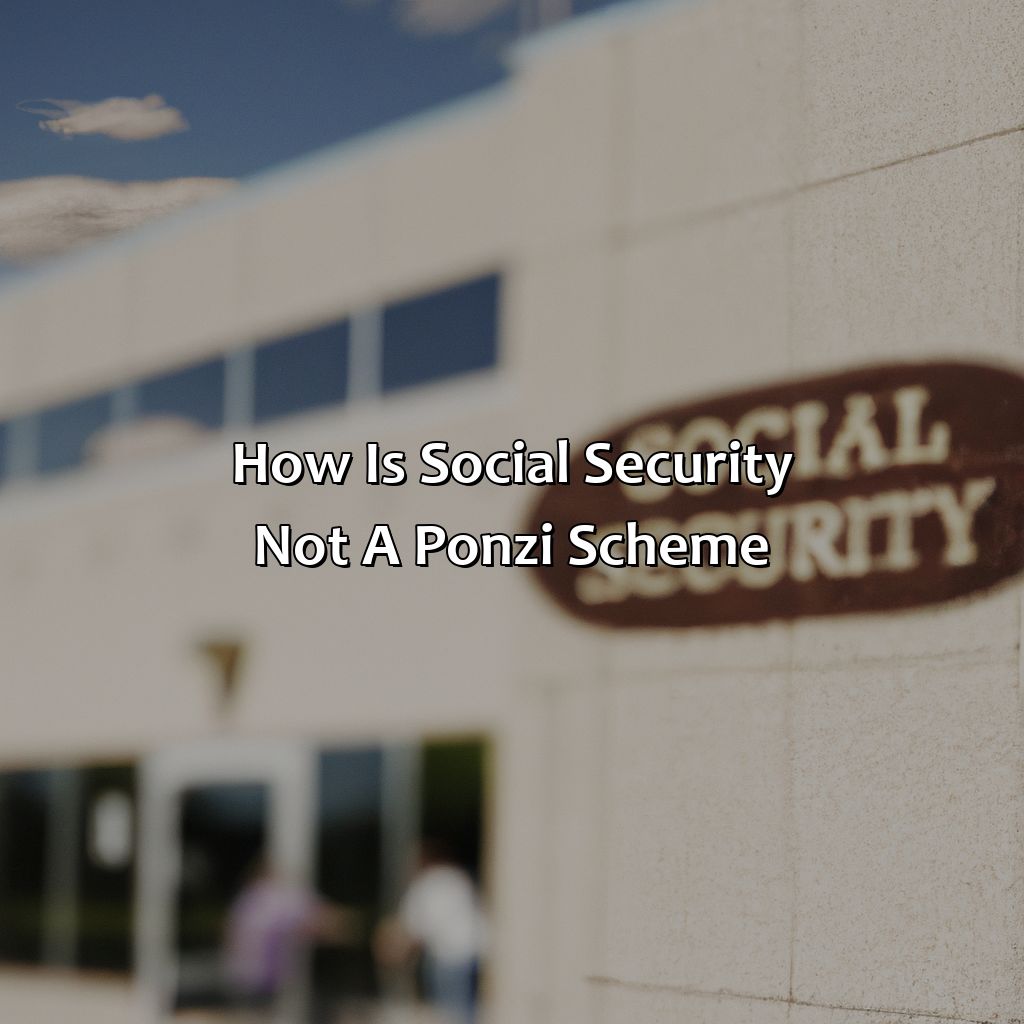How Is Social Security Not A Ponzi Scheme?
Key Takeaway:
- Ponzi schemes rely on continuously recruiting new investors to generate profits, while Social Security is funded through taxes on current workers and employers, ensuring a steady source of revenue.
- Unlike a Ponzi scheme, Social Security benefits are guaranteed by the federal government and backed by the full faith and credit of the United States, providing a level of security and stability for beneficiaries.
- While Social Security faces long-term funding challenges, adjustments can be made to ensure its sustainability, including raising the retirement age, increasing payroll taxes, and reducing benefits for higher earners.
Are you worried Social Security is nothing more than a Ponzi scheme? Then worry no more, because this article will explain why this is not the case. You’ll learn why Social Security is a legitimate investment and a dependable part of retirement savings.
What is a Ponzi scheme?
Want to know about Ponzi schemes? Let’s examine their characteristics. This will give you a better understanding of how they work and help you tell them apart from other investments.

Image credits: retiregenz.com by Yuval Duncun
Characteristics of a Ponzi scheme
Ponzi Schemes are fraudulent investment schemes that attract investors with the promise of high returns. They rely on the recruitment of new investors to pay off older ones, rather than generating actual profits.
- Promise of high returns
- No actual profit-generating business/activity
- Recruitment of new investors to pay off older ones
- Using other people’s money for personal gain
- Unsustainable and collapses when enough new investments do not come in
- The mastermind behind the scheme benefits while others lose their money.
It is crucial to note that Ponzi Schemes operate outside the law and constitute fraud, whereas social security does not. Social Security is a federal program created in 1935 and funded through payroll taxes paid by employees and employers. It provides financial assistance to eligible individuals who have contributed to it through their work history contributions. Millions of Americans depend on social security as a critical source of retirement income.
While social security may have some challenges – such as unfunded obligations – these can be addressed through adjustments without violating any laws or ethical principles.
One suggestion to prevent falling victim to a Ponzi Scheme is researching before investing your money in any scheme or product. Ensure you review all materials provided by the scheme sponsor, ask questions about its operations, and seek advice from independent third parties such as trusted financial advisors or legal experts. Additionally, if an opportunity sounds ‘too good to be true’, it probably is – so always proceed with caution.
Social Security is like a Ponzi scheme, except instead of your ‘investments’ going towards a private scammer, they go towards a public one.
Social Security and Ponzi scheme comparison
This section, called ‘Social Security and Ponzi Scheme Comparison’, will explain the comparison between Social Security and a Ponzi scheme. It has sub-sections. These are:
- ‘How Social Security is Different from a Ponzi Scheme’
- ‘How Social Security is Sustainable’
- ‘Criticisms of Social Security’
This will give you a comprehensive solution. Examining the key differences between Social Security and a Ponzi scheme will help you understand better how the program is sustainable and the criticisms against it.

Image credits: retiregenz.com by David Jones
How Social Security is different from a Ponzi scheme
Social Security differs from a Ponzi scheme because it is backed by the government and funded by taxes. The system is designed to provide a safety net for the elderly, disabled, and survivors. Unlike a Ponzi scheme, Social Security accounts are not promised returns that depend on new participants joining the program.
Furthermore, Social Security is designed to be sustainable in the long term with projected payouts based on demographic data and life expectancy rates. Contributions to the program are mandatory and made throughout an individual’s working life.
It’s worth noting that some critics argue that Social Security shares similarities with a Ponzi scheme due to its reliance on younger generations to fund payments to current beneficiaries. However, this viewpoint overlooks key differences between public policy programs and fraudulent investment schemes.
Pro Tip: Understanding these critical distinctions can help one build financial knowledge and confidence when planning retirement savings goals. Social Security is sustainable as long as future generations keep ignoring their parents’ advice to save for retirement.
How Social Security is sustainable
Social Security is an enduring financial framework that has maintained its sustainability through the years. One way Social Security stays sustainable is by offering benefits to retirees based on their past work earnings and contributions, essentially treating it as an earned benefit instead of a handout.
Another factor contributing to the sustainability of Social Security is its diverse funding sources. It receives support not only from employees’ payroll taxes but also from employers, self-employed individuals, and special taxes on specific types of income such as interest and dividends. By having multiple streams of income, Social Security remains more stable and less susceptible to economic changes or unexpected events.
Moreover, measures have been taken over the years to ensure that Social Security remains viable for future generations. For example, in 1983 policymakers adjusted the program’s finances by increasing the retirement age and reducing benefits to help keep in line with changing demographics and economic conditions.
Interestingly enough, Franklin D. Roosevelt founded this retirement system in 1935 during the depression under The New Deal policy, which aimed at improving public welfare amid dire economic circumstances.
Social Security: Because who needs savings when you can rely on the government to rob from Peter to pay Paul?
Criticisms of Social Security
Social Security has been criticized for its sustainability and effectiveness in providing retirement benefits. Detractors argue that the system is flawed, and others suggest that it is a Ponzi scheme because it relies on new taxpayers to fund benefits for current retirees. However, supporters point out that Social Security works differently than a Ponzi scheme as people are contributing money through payroll taxes, which is then paid out to current beneficiaries. The system is backed by the government, making it more secure.
The main criticism of Social Security involves its long-term financial problem as trust fund reserves are expected to deplete by 2034. Additionally, some argue that benefits are not enough to cover living expenses or offer significant retirement savings. However, the program has helped millions of seniors afford basic necessities and healthcare.
Notably, President John F. Kennedy recognized Social Security’s success in preventing senior poverty during his presidency—almost half of seniors who lived in poverty in the early 60s were lifted out of poverty with Social Security assistance.
Five Facts About How Social Security Is Not a Ponzi Scheme:
- ✅ Social Security is not a pyramid scheme because it is a federal program backed by the full faith and credit of the United States government. (Source: Social Security Administration)
- ✅ Social Security beneficiaries are not paid returns on investment, but rather benefits based on contributions made into the system throughout their working years. (Source: AARP)
- ✅ Social Security is not designed to generate profits, but rather to provide a safety net for Americans who are retired, disabled, or have lost a family member. (Source: Investopedia)
- ✅ Social Security is not voluntary, as all workers in the United States are required to contribute a portion of their earnings to the program. (Source: Social Security Administration)
- ✅ Social Security is not at risk of running out of money in the near future, as the program has enough reserves to pay out benefits for decades to come. (Source: Social Security Administration)
FAQs about How Is Social Security Not A Ponzi Scheme?
How is social security not a Ponzi scheme?
Social Security is not a Ponzi scheme because it is a social insurance program that is funded through payroll taxes, which are collected from current workers and used to pay current beneficiaries. Unlike a Ponzi scheme, where early investors are paid with the money of later investors, Social Security is a program that provides a guaranteed minimum level of retirement or disability benefits to all those who are eligible.
Can social security go bankrupt?
The Social Security Administration predicts that the program will be able to pay full benefits until 2034 and partial benefits thereafter. While the program currently faces financial challenges, it is far from being bankrupt. However, the government may need to make changes to the program, such as increasing the retirement age, raising payroll taxes, or reducing benefits, in order to ensure its long-term sustainability.
Is social security a good investment?
Social Security is not an investment in the traditional sense, but rather a social insurance program that provides a guaranteed minimum level of retirement or disability benefits. While the return on investment may be lower than what an individual could earn by investing in the stock market, Social Security provides a safety net that can protect individuals from financial hardship in their retirement years.
Can I opt-out of social security?
Most private sector workers in the United States are required to participate in the Social Security program. However, certain government and religious workers may be exempt from Social Security taxes, and some workers may be able to opt-out of the program if they meet certain requirements.
What happens to social security if you die before retirement?
If a worker dies before retirement, their surviving spouse and children may be eligible for survivor benefits from Social Security. The amount of the benefit will depend on the worker’s earnings record and the number of years worked. Additionally, a lump-sum death benefit may be paid to the worker’s surviving spouse or child.
What happens to social security if you move to another country?
If you move to another country, you may still be eligible to receive Social Security benefits. However, you must meet certain requirements, such as having enough work credits and being eligible for benefits. Your benefits may also be subject to certain restrictions, such as taxes and withholding rates, depending on the country you move to.
